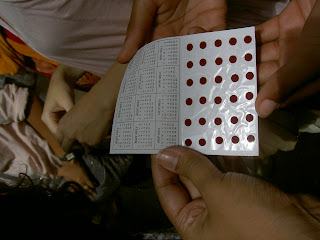At headquarters we learned about PSI operations, goals surrounding the Women’s Health Program (WHA).
The WHA seeks to empower women and influence several key target audiences like providers, pharmacists, opinion leaders through the use of social marketing to promote services (not products). PSI provides information on contraceptives and medical abortions (for health reasons)to women in their target communities and has engaged with interested providers to promote the use of intra-uterine devices (IUDs) as a preferred method for the Indian population. In some ways, the IUD is regarded as an optimal long term contraceptive solution given its reversibility. However since numerous myths surround its use, PSI employs interpersonal communicators (IPCs) to disseminate information on a one-on-one basis to help dispel these myths. These IPCs are educated with Master’s degrees in Social Work, undergo periodic training and bring community experience to their job. Additionally, PSI employs an Integrated Communication Campaign to disseminate their message that IUDs are a form of empowering women to make reproductive choices.


One striking element was PSI, India’s recognition that Indian women in families live within a cultural milieu where many members of the family and even friends (husband, mother-in-law, sister-in-law, social circle) are jointly involved in reproductive decisions. PSI supports this situation by working with the women over a period of time through multiple visits, offers to explain information to family members, establishment of a telephonic helpline, physician referral and follow-up services. In a way, there is potentially both value and threat in peer pressure and husband support. PSI uses the helpline call centers as way to expand positive word-of-mouth stories surrounding IUD use.
The GWU Team also visited a physician service provider who partners with PSI and observed IPCs working in a community. PSI employs a multi-tier management information system and has collected field data over the past two and half years on their current initiatives. While some of this data is used to monitor programmatic progress and impact, much of it remains to be analyzed (potential opportunities for graduate public health students!).


A key challenge facing a large international NGO working in the Indian space is funding limitations since donors are inclined to work with governmental institutions or local Indian NGOs. Other areas of concern for an institution like PSI is ensuring their program and efforts are sustainable in the long run within the communities even after PSI pulls out.
An interesting feature of the PSI approach was some of culturally specific marketing efforts employed in the Integrated Communication Campaign. For example, (1) giving a freebie in the form of “stick-on bindis” (red dots worn on the forehead by most Indian women everyday) with contraceptive or provider information stamped on the back; (2) hosting mother-in-law and daughter-in-law meet-ups to provide an intergenerational forum where women’s health issues may be discussed; (3) hosting mothers meeting groups for mothers to share their concerns with other mothers; and (4) having physicians host small community get-togethers where women can ask questions in an informal set-up. PSI’s evidence indicates that women are more likely to attend the clinic of these physicians who initially met them in an informal get-together.
On the whole, the PSI site visit allowed a useful point of comparison to some of the smaller Indian NGOs observed earlier in the trip. PSI India is clearly able to take advantage of a rather solid and well established infrastructure from the parent organization. This was evident at all stages from the initial PowerPoint presentation at the office to the level of training afforded to the Interpersonal Communicators. This type of support ensures the organization is able to continue its work in multiple spheres simultaneously to interact with, influence multiple target audiences and influence public policy.



Hello Learners,
ReplyDeleteI am an online Hindi tutor offering Hindi classes to persons who will be working or volunteering in India.
my email - ruchirma@gmail.com
skype - mruchir
If you are planning to start an NGO, click here: How to start an NGO
ReplyDeleteI really appreciate the effort you put into creating such informative content. Your blogs are always a great resource. Keep inspiring! By the way, if anyone requires UPI TPAP license registration, I’d be glad to assist. Looking forward to more great posts from you!
ReplyDelete